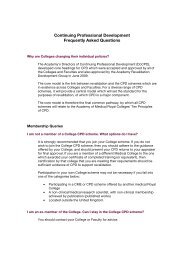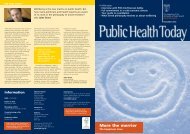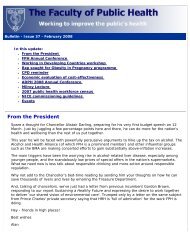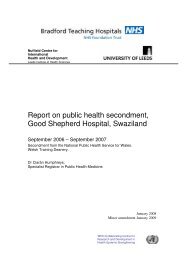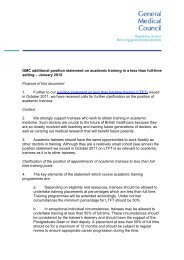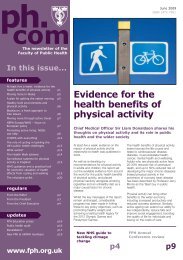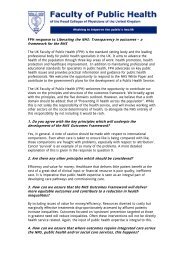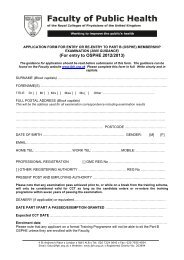A Chronology of State Medicine, Public Health, Welfare and Related ...
A Chronology of State Medicine, Public Health, Welfare and Related ...
A Chronology of State Medicine, Public Health, Welfare and Related ...
Create successful ePaper yourself
Turn your PDF publications into a flip-book with our unique Google optimized e-Paper software.
presented to it <strong>of</strong> abuse <strong>and</strong> deprivation. See 1866.<br />
A Royal Commission was set up on the Prevention <strong>of</strong> River Pollution. It met<br />
intermittently over the next nine years. Its Third Report stated that serious pollution arose<br />
from<br />
1864 Cont - 1865<br />
1864 cont the growth <strong>of</strong> the population <strong>and</strong> from the introduction <strong>of</strong> sewerage systems<br />
following the 1848 <strong>Public</strong> <strong>Health</strong> Act. The Report called for a central authority <strong>and</strong> an<br />
increase in River Boards. See 1865 <strong>and</strong> 1876.<br />
Louis Pasteur (see 1856) showed that infections were caused by micro-organisms.<br />
"A Manual <strong>of</strong> Practical Hygiene" by EA Parkes (1819-76, first pr<strong>of</strong>essor <strong>of</strong> military<br />
hygiene) was published. The book was the first important treatise on hygiene.<br />
1865 Sewerage Utilisation Act (28&29 Vict., c.75) created sewer authorities; gave town<br />
councils <strong>and</strong> other health authorities powers to dispose <strong>of</strong> sewerage for agricultural purposes;<br />
<strong>and</strong> to take proceedings against persons polluting rivers. See 1866 <strong>and</strong> 1867.<br />
Prisons Act (28&29 Vict., c.126) created a national system <strong>of</strong> the governance <strong>of</strong><br />
prisons involving the closure <strong>of</strong> many local prisons; introduced a more uniform, although<br />
harsh, st<strong>and</strong>ard <strong>of</strong> treatment; <strong>and</strong> set out detailed regulations about discipline <strong>and</strong> punishment<br />
<strong>of</strong> prisoners, the duties <strong>of</strong> prison <strong>of</strong>ficers <strong>and</strong> the appointment <strong>of</strong> visiting justices.<br />
Union Chargeability Act (28&29 Vict., c.79) substituted a twelve months residence<br />
qualification for help from the local rates, in place <strong>of</strong> the rule that any pauper, no matter how<br />
long his or her residence in the parish, must be sent back to his or her parish <strong>of</strong> birth. The act<br />
permitted Guardians to examine the books <strong>and</strong> papers <strong>of</strong> the overseers <strong>and</strong> transferred the<br />
raising <strong>of</strong> the poor rate from the parish to the union.<br />
Exchequer <strong>and</strong> Audit Department Act (28&29 Vict., c.93) created the first effective<br />
machinery for a retrospective annual audit <strong>of</strong> expenditure <strong>and</strong> for the treasury to enforce strict<br />
st<strong>and</strong>ards <strong>of</strong> financial practice throughout Whitehall.<br />
Locomotives on Turnpike <strong>and</strong> Other Roads Act (28&29 Vict., c.93), the "Red Flag"<br />
Act, introduced a 4 m.p.h. limit on highways; <strong>and</strong> mechanical vehicles had to be preceded by<br />
a man carrying a red flag. See 1896.<br />
An Act (28&29 Vict., c.90) established a single fire brigade within the London<br />
metropolis.<br />
Octavia Hill (1838-1912, philanthropist) started purchasing houses for improvement;<br />
subsequently devoted herself to housing reform; <strong>and</strong> in 1895 was a co-founder <strong>of</strong> the<br />
National Trust .<br />
Start <strong>of</strong> the main drainage scheme for London.<br />
The Lancet set up a Commission to Inquire into the <strong>State</strong> <strong>of</strong> Workhouse Infirmaries.<br />
The Commission published reports in successive issues <strong>of</strong> The Lancet including a general<br />
report <strong>and</strong> detailed accounts <strong>of</strong> individual infirmaries. See 1867.<br />
Joseph Lister (later Lord, 1827-1912, surgeon in Edinburgh <strong>and</strong> later in London at<br />
King's College Hospital) first used carbolic spray in surgery. The results were published in<br />
The Lancet in 1867.<br />
Elizabeth Garrett (later Anderson, see 1862) qualified in medicine (Licentiate <strong>of</strong> the<br />
Society <strong>of</strong> Apothecaries); thought to be the first woman to qualify in Britain, but see James<br />
Barry (below). Garrett was admitted to the medical register in 1866. She founded the first<br />
hospital in Engl<strong>and</strong> staffed by woman doctors; in 1874 she was part founder, with Sophia<br />
Jex-Blake (1840-1912), <strong>of</strong> the London School on <strong>Medicine</strong> for Women in association from<br />
1877 with the London (later Royal) Free Hospital, <strong>and</strong> its Dean from 1883 to 1905.



